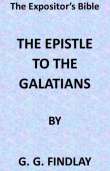You are here
قراءة كتاب The Expositor's Bible: The Epistle to the Galatians
تنويه: تعرض هنا نبذة من اول ١٠ صفحات فقط من الكتاب الالكتروني، لقراءة الكتاب كاملا اضغط على الزر “اشتر الآن"

The Expositor's Bible: The Epistle to the Galatians
align="right">361
THE PROLOGUE.
Chapter i. 1-10.
CHAPTER I.
THE ADDRESS.
"Paul, an apostle (not from men, neither through man, but through Jesus Christ, and God the Father, who raised Him from the dead), and all the brethren which are with me, unto the Churches of Galatia."[1]—Gal. i. 1, 2.
Antiquity has nothing to show more notable in its kind, or more precious, than this letter of Paul to the Churches of Galatia. It takes us back, in some respects nearer than any other document we possess, to the beginnings of Christian theology and the Christian Church. In it the spiritual consciousness of Christianity first reveals itself in its distinctive character and its full strength, free from the trammels of the past, realizing the advent of the new kingdom of God that was founded in the death of Christ. It is the voice of the Church testifying "God hath sent forth the Spirit of His Son into our hearts." Buried for a thousand years under the weight of the Catholic legalism, the teaching of this Epistle came to life again in the rise of Protestantism. Martin Luther put it to his lips as a trumpet to blow the reveillé of the Reformation. His famous Commentary summoned enslaved Christendom to recover "the liberty wherewith Christ hath made us free." Of all the great Reformer's writings this was the widest in its influence and the dearest to himself. For the spirit of Paul lived again in Luther, as in no other since the Apostle's day. The Epistle to the Galatians is the charter of Evangelical faith.
The historical criticism of the present century has brought this writing once more to the front of the conflict of faith. Born in controversy, it seems inevitably to be born for controversy. Its interpretation forms the pivot of the most thoroughgoing recent discussions touching the beginnings of Christian history and the authenticity of the New Testament record. The Galatian Epistle is, in fact, the key of New Testament Apologetics. Round it the Roman and Corinthian Letters group themselves, forming together a solid, impregnable quaternion, and supplying a fixed starting-point and an indubitable test for the examination of the critical questions belonging to the Apostolic age. Whatever else may be disputed, it is agreed that there was an apostle Paul, who wrote these four Epistles to certain Christian societies gathered out of heathenism, communities numerous, widely scattered, and containing men of advanced intelligence; and this within thirty years of the death of Jesus Christ. Every critic must reckon with this fact. The most sceptical criticism makes a respectful pause before our Epistle. Hopeless of destroying its testimony, Rationalism treats it with an even exaggerated deference; and seeks to extract evidence from it against its companion witnesses amongst the New Testament writings. This attempt, however misdirected, is a signal tribute to the importance of the document, and to the force with which the personality of the writer and the conditions of the time have stamped themselves upon it. The deductions of the Baurian criticism appear to us to rest on a narrow and arbitrary examination of isolated passages; they spring from a mistaken à priori view of the historical situation. Granting however to these inferences, which will meet us as we proceed, their utmost weight, they still leave the testimony of Paul to the supernatural character of Christianity substantially intact.
Of the four major Epistles, this one is superlatively characteristic of its author. It is Paulinissima Paulinarum—most Pauline of Pauline things. It is largely autobiographical; hence its peculiar value. Reading it, we watch history in the making. We trace the rise of the new religion in the typical man of the epoch. The master-builder of the Apostolic Church stands before us, at the crisis of his work. He lets us look into his heart, and learn the secret of his power. We come to know the Apostle Paul as we know scarcely any other of the world's great minds. We find in him a man of the highest intellectual and spiritual powers, equally great in passion and in action, as a thinker and a leader of men. But at every step of our acquaintance the Apostle points us beyond himself; he says, "It is not I: it is Christ that lives in me." If this Epistle teaches us the greatness of Paul, it teaches us all the more the Divine greatness of Jesus Christ, before whom that kingly intellect and passionate heart bowed in absolute devotion.
The situation which the Epistle reveals and the personal references in which it abounds are full of interest at every point. They furnish quite essential data to the historian of the Early Church. We could wish that the Apostle, telling us so much, had told us more. His allusions, clear enough, we must suppose, to the first readers, have lent themselves subsequently to very conflicting interpretations. But as they stand, they are invaluable. The fragmentary narrative of the Acts requires, especially in its earlier sections, all the illustration that can be obtained from other sources. The conversion of Paul, and the Council at Jerusalem, events of capital importance for the history of Apostolic times, are thereby set in a light certainly more complete and satisfactory than is furnished in Luke's narrative, taken by itself. And Paul's references to the Judean


